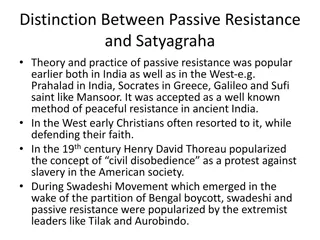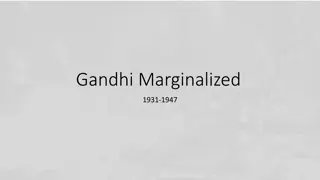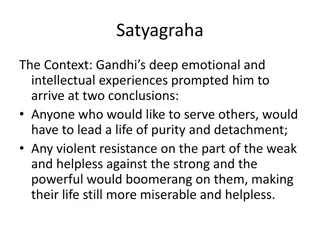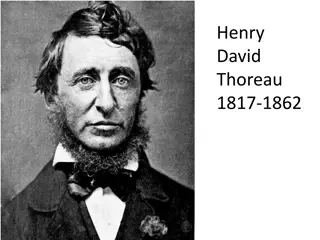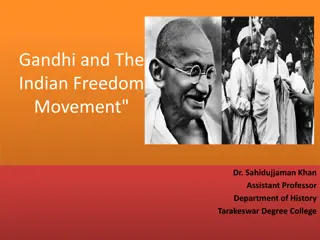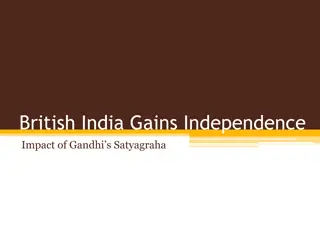Comparison between Passive Resistance and Satyagraha Theories
Passive resistance was used historically by figures like Gandhi, Thoreau, and early Christians for peaceful resistance. Satyagraha, introduced by Gandhi, differs by being a weapon of the strong focusing on love, self-realization, and unity rather than opposition and physical force. It emphasizes spi
2 views • 11 slides
Gandhi's Marginalization in Indian Nationalist Politics from 1931-1947
The 1930 Salt Satyagraha propelled Gandhi into the heart of nationalist politics, challenging colonial rule. However, by the end of the decade, the tide shifted away from his influence towards a more conventional political landscape dominated by power negotiations and elections, leading to Gandhi's
4 views • 11 slides
Satyagraha: Gandhi's Nonviolent Resistance
Gandhi's concept of Satyagraha emphasized truth and nonviolence, leading to passive resistance against injustice. Rooted in purity and detachment, Satyagraha uplifts both the oppressed and oppressors, offering a dynamic and powerful means to confront evil without bitterness or revenge.
0 views • 6 slides
Influence of Thoreau's Civil Disobedience on Gandhi and Martin Luther King Jr.
Gandhi's encounter with Henry David Thoreau's essay "Civil Disobedience" while in jail in South Africa sparked his implementation of nonviolent resistance called Satyagraha. This powerful concept of refusing to cooperate with injustices was adopted by Martin Luther King Jr., who considered Thoreau's
0 views • 22 slides
Mahatma Gandhi and the Indian Freedom Movement
Mohandas Karamchand Gandhi, also known as Mahatma Gandhi, played a pivotal role in India's freedom movement with his philosophy of nonviolence and civil disobedience. Born in 1869 in Porbandar, Gujarat, Gandhi's experiences in South Africa and return to India in 1915 shaped his activism. He led move
0 views • 11 slides
Impact of Gandhi's Satyagraha on British India's Independence Struggle
Gandhi's principles of Satyagraha, emphasizing civil disobedience and non-violence, played a crucial role in India's fight for independence from British colonial rule. His leadership and methods such as boycotts and peaceful protests garnered international support, pressuring the British government
0 views • 18 slides
